#epic quest event
Text

Who else stopped breathing at this point in the event?
👌Peak storytelling👌
I always come back to Genshin for Xiao (and Albedo). Their backstories and personalities are the most intriguing in my opinion.
I really wanted to hug Xiao in this event, too bad the game doesn’t let us. T-T
#genshin impact#genshin xiao#genshin lumine#perilous trail quest#xiao’s self-sacrifice#the music was epic too#aaaa best event yet#xiao is best boi#fanart#zsocca#zsocca55#xiaolumi
814 notes
·
View notes
Text
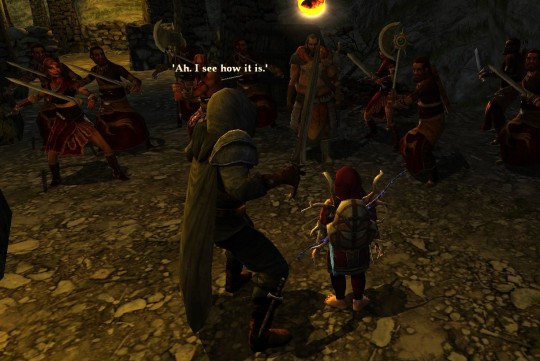
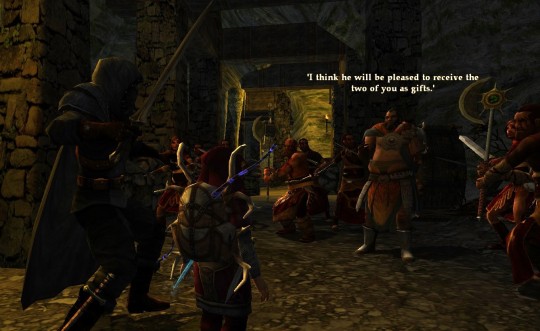
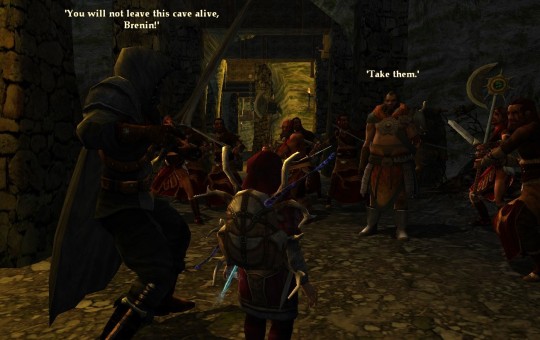
Lothrandir wasn't entirely wrong in the last panel. even if brenin left this particular cave alive, he will still die in one.
#lotro#allies of the king#lotro spoilers#yes this part is a decade old now but for new players who follow this blog i will tag big events in the stories#i also tag the names of the epic quest books
12 notes
·
View notes
Text
The LotRO fandom on Tumblr ought to have creative weeks like some other fandoms do; a week with themed days where people make art or fics or other transformative work to suit the theme and post them on the day in question. I love that format for content creation challenges; it's low-pressure, fairly casual, doesn't threaten burnout like month-long challenges do, and the short format of it means we could have multiple events throughout the year with different themes, a must-have for a piece of media as big as LotRO.
#lotro#one event like idk an October challenge just couldnt hope to encapsulate everything#but yeah im thinking there could be a week with OC themed prompts#a week with festival and event themed prompts#a week for epic quests and a week for side quests#maybe a couple of appreciation weeks like female character appreciation or Ranger appreciation or something#a week for different factions#and like multiple prompts for each day just to keep things super casual#one that though is that often these fandom weeks just drop the prompts on the first day and i would like to drop them in advance#like two or three weeks in advance#maybe a whole month just for the round numbers#im definitely thinking of throwing out my own week but maybe not until like mid to late January#got the redwall midwinter gift exchange to moderate so you know#busy
13 notes
·
View notes
Text
I have a problem and that problem is this man
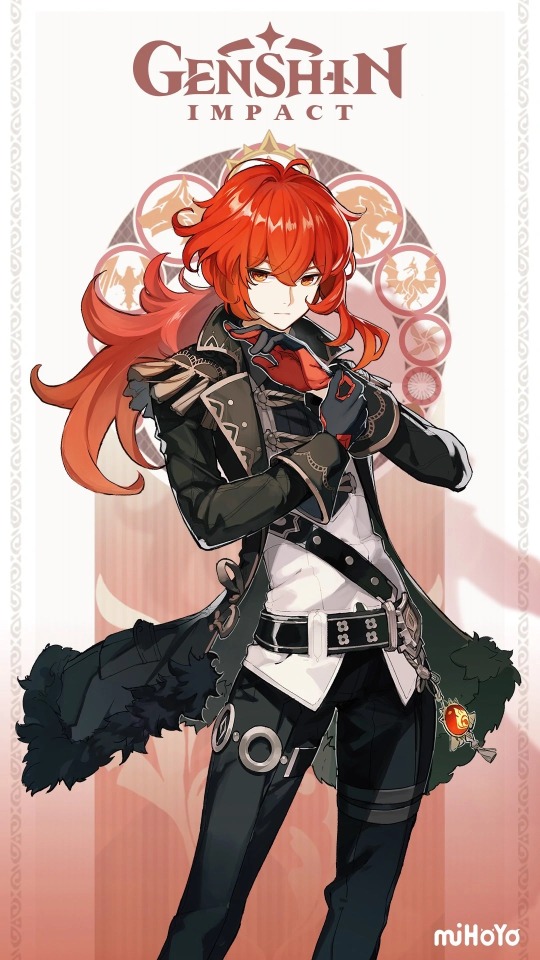
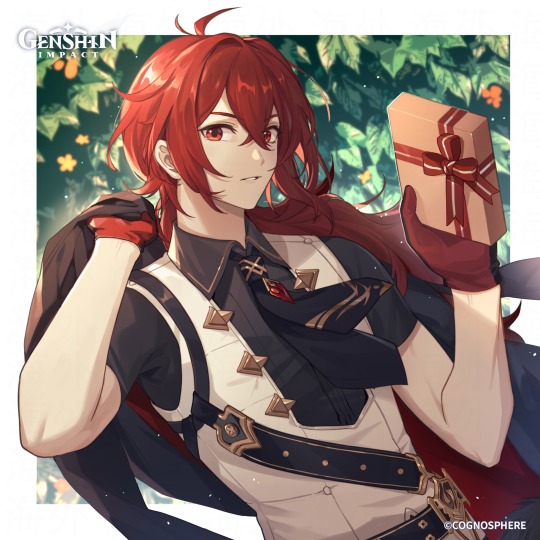
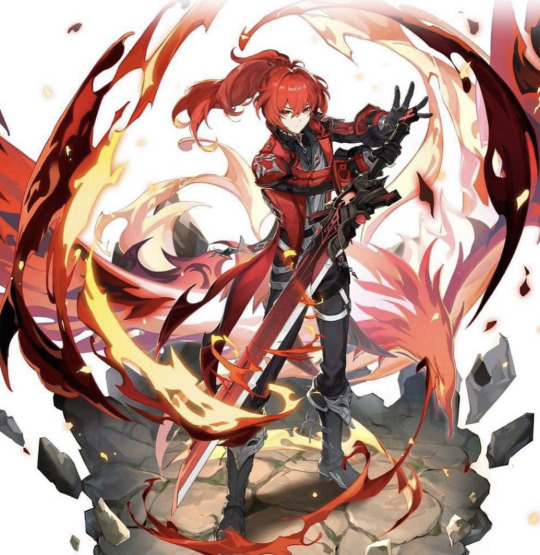
#kiwi talks genshin#kiwi simps for diluc#redoing his story quest was an experience my gosh#i had forgotten how much i love that quest#i am SO EXCITED for the event wuest that tells us about his skin#its gonna be EPIC
4 notes
·
View notes
Text
In the cosmic void, a humble starseed blooms, An epic quest begins, an unlikely hero's journey unfolds. With ancient magic bound in artifacts, the hero transforms, and worlds collide. A tale of destiny, courage, and change, woven in starlit verse.
1 note
·
View note
Text
In the land of dreams, where magic ruled the skies, a humble farmer found a shimmering artifact. His life transformed, he embarked on an epic quest, united by chance with unlikely heroes. Together, they fought monstrous beasts and conquered ancient curses, forging bonds that defied all odds. The artifact's power revealed their destiny - to save a world on the brink of darkness. United, they shattered the veil, and in the light of hope, a new era dawned.
#fantasy#magical artifacts#epic quests#unlikely heroes#transformation#life#event#hope#darkness#bonds#curses#monstrous beasts
1 note
·
View note
Text
is there, perchance, an epic questline summary of Things That Happen somewhere?
#i'm trying to make a big long timeline [okay not really a timeline because it has nothing to do with dates/times]#thingy of sae's character progression through the epic#and i really don't wanna have to go through each quest per book#for all the important events that are literally gonna be mentioned maybe 1 time
1 note
·
View note
Text
In Which Space Orcs are Men
[AO3]
A "what if humans are space orcs" take on Dagor Dagorath.
(Aka the prophecied apocalypse of Middle Earth. Scifi story accessible to non-LotR nerds!)
Elves weren't really supposed to leave Earth. That's what they told us—the Elves, that is, told people thousands of years ago, when Elves could still be found here and there. When I was born, elves were nearly as much a fairy tale as they’d been on Ancient Earth.
Elves weren't supposed to leave Earth, the Elves said in the fairy tales, and in a few old scraps of records scattered around known space. They literally weren't made for it. They could only do it if they brought Earth with them—Arda they called it, leaves or dirt, water or a rare bubble of air, perfectly preserved in a white crystal. There are tons of tales about Elves losing their lifeline jewels—their hearts, their silimirs—and roping people into epic quests to get them back before they—the Elf—faded to nothingness.
Even the jewels weren't enough, though. That's why there are also stories about Elves who fell in love with a person or a place and stayed there until they faded, or Elves who charmed someone into following them back to Fairyland on Earth...because whatever they said, Elves didn't really live on Earth. Humans have maintained their home planet as a monitored nature reserve since like the 40th century, open only to vetted research teams and serious Human religious pilgrimages. The most confirmed accounts of Elves that exist are of their ships appearing out of nowhere, with no trace of any tech that would enable it, at random, always-changing points within 100 miles or so of Earth.
Nobody ever came back from trying to follow Elves home. Mostly Elves tried to dissuade people from trying. But there are always crazy and curious people—and Elves usually attracted those, because any Elf who left the home they were "made" for was usually crazy and curious themselves.
Those were the stories I grew up with. There was a cave near the orphans' creche which was supposed to be haunted by a faded Elf. I didn't really believe it—like I said, the last confirmed Elf was last seen like 5,000 years ago, and not even on my planet. People have met two dozen new sentient races since then. We've discovered that reincarnation is probably real (just functionally untrackable), prompting the Pan-Religious Reform Wars. The last person to see a live Elf was still traveling via natural wormholes—they literally didn't know that you could loop pi.
.
When the Human natal sun started to turn really red, it wasn’t that big a deal at first. It’s a very important, very sad event for any species, but it happens to everyone eventually. It happened to the Hectort just after we invented interstellar flight. There were some unusual gravatic waves around Earth’s Sol, but nothing worth noting to anyone who didn’t already care for personal reasons.
Then the Elves sent us a message.
The local Parks Service picked it up, of course. I bet the Humans meant to hush it up at first—though the Centaurian government still won’t admit anything—but someone leaked it immediately on the intergalactic net. It should’ve only been famous as a joke of a hoax, but…
It was basically just a metal box with rudimentary fire-thrusters soldered on the sides. It contained two things. The first was a recording/replaying device so antiquated that the only way they got it working is that it was already playing on loop, and didn’t stop until someone disconnected it from its power source.
The message was in Ancient Bouban, which some folklorist soon announced is the latest language an Elf could know, since the last known Elf went back to “Arda.” The voice somehow sounded melodic to every species with a concept of music, from the screeching Vesarians to the deep-sea sub-sonic Thinkers, even when translated through cheap, staticky speakers. And to most species, the speaker was audibly distraught.
They said,
This is the final message from the Firstborn of Eru to the Secondborn, and everyone else. The Battle of Battles has come, and we…are losing. If there are any who remember the ancient love and loyalty which bound our peoples, if there are any heirs remaining of Thargalax the Magnificent, of Nine-Fingered Frodo, of the noble Houses of Haleth, Hador and Beor—
The speaker drew a sharp breath, there.
—by great oaths and greater friendship I bid you now to raise your swords and ride to our aid. Ride as swiftly as you can!
We will hold for another year. We will, they said determinedly. After that, it is unlikely that…
Another, shakier breath. A smile forced into a voice which would rather weep.
Fëanáro and Nienna believe there is a way to destroy the Straight Road. If we must, if it comes to it, we will do so, and trap the First Enemy here in this dying world with us. Though I don’t know about—
Hair-aristocrat! a more distant, slightly less perfectly melodious voice called, in a language so dead that they needed computers to decode it. The walls are falling, we need to go!
If you never hear from us again, and no sudden discord arises among you, you will know we succeeded, the first speaker said quickly. If otherwise…I am sorry. Either way, I bid you all only, remember us! Oh beautiful flames, remember us, as we have ever remembered y—
There was a sudden screech of tearing metal, a defiant, musical battle-cry, and a jarring silence. Then the message restarted.
And that wasn’t even the strangest thing in the box. The strangest thing was the recorder’s power source, which was powering the whole tiny rocket mechanism as well. It was an Elf-jewel right out of a fairy tale, a fist-sized, translucent not-quite-diamond—but instead of rock or water or a much-loved scrap of plant, the only thing it held was light.
...Kind of. It isn’t normal light. It arguably isn’t light at all, as we know it—scientists now think it’s technically some sort of plasmoid aether, except it only acts like a plasmoid aether about half the time.
It has no detectable source within the jewel. It fully illuminates whatever space it’s in, no matter how big. Its visible radiation is a frequency, the scientists say, that matches a hyper-accelerated version of what the universe must’ve sounded like in the split second after the Big Bang.
It makes people remember things, when they see it in person or sometimes even across a holo. Some remember a similar light in a strange traveler’s eyes. Others, dreamily enchanted valleys where spring never faded, or tall castles, bright swords, and stern and glorious lords and ladies. And some of us got hit with a whole lifetime of memories in one go: an identical gem on the brow of a sober forest king, friends who slipped through trees like shadows save for their merry laughter, an impossibly beautiful gold-haired maiden dancing in a glittering cavern...
(And all the pain and loss that came with them.)
And some people just remember the sight of a distant star—in another world, in another lifetime.
Reincarnation was provable but untraceable…until now.
The Thinker ambassador on Astrolax Station 5 was the first to kick up a fuss. Most Thinkers never leave their home planet, they're too huge and aquatic. But like I said, there's always crazy and curious people. The ambassador started bellowing the second che heard the message, without even seeing the light, because, "I know him! My Wisdom! We must send aid!" That made some news, and random other people shared their own, less dramatic revelations, and soon a compilation swept the net with timestamps showing that most of them were organically independent, not just jumping on the bandwagon….
Even that might've gotten written off intergalactically. The Thinkers are big in reincarnationist circles, on account of how they claim that deep in their planetary ocean they can hear echoes of their past lives. But being mostly planet-bound means they're not really influential on a big political level. Or it would've sparked another surge of the Reform Wars, and everybody would've remembered the rock, but not the recording. Or there would’ve been a fight over this potentially infinite energy source (though that is so last giga-annum)….
But first it was shown in person to the current Director of the Admiralty of the Astral Alliance, President of the X-ee Empire and Matron of the House of S,sh, Ch’ees/i’i S,sh. I was actually there—I was Captain of her ceremonial Alliance guards, in a last-ditch attempt to salvage my career after Zanzibus. Very ceremonial, considering the X-eee have laser-proof shells and pincers and I have, what, opposable thumbs? Vestigial tusks?
I wasn’t paying attention at first, too busy being suddenly assaulted by all my own memories. So I missed the President freezing mid-step and gasping (in X-eee), “Mother.” I also missed her rising alarm call of an attempt to speak Ancient Elvish without an Elvish tongue or lips.
I sure didn’t miss her snap back to X-eee for a sharp call to attention, and everything that followed: the call to arms! The rousing of the Alliance! A tour of the galaxy, to find anyone and everyone else in whom the Light could awaken ancient memories! And for the love of X'eeh, why had nobody figured out how to get back to Fairyland with this thing yet, and every warship in the quadrant?!
If I believed in the One Behind, or in any other creator god or gods—I'm not saying I do, but if I did, if there really is something out there all-powerful and all-kind—then it'd be because out of every soul in the entire universe, the probably one in the best position to act on the Elves' message turned out to have, from a past life, two parents and a much-loved twin still in Fairyland. Like, that's insane, right?
I stayed with the Director's ceremonial guards for the whole tour, actually more than ceremonial for once—it was the weirdest mission of my life, and I've been on a lot of weird missions. Or supposedly routine missions that got weird (and usually disastrous). My friends joke that I'm cursed. S,sh requisitioned an Inquiry-class ship, so the science boffins could study the Light and jewel along the way, and we started wormholing at weft speed, hitting a new planet every week. Sometimes every day. In each major spaceport and ground-city, S,sh stood with the jewel on the highest available point and gave a recruitment speech for going to save the Elves and fight the oldest enemy of all reality.
Honestly, it seemed a little redundant? The Astral Alliance was made for this sort of rescue mission (and for escorting trade convoys). But I was...if not happy, then sure as hell more self-certain with my ancient memories restored, and most people who joined up seemed to agree. It was mostly people who remembered, when exposed to the Light, who joined—so before long, we had a whole tag-along trail of mostly civilian ships, trying to get up to Alliance Fleet standard on the road in less than a year.
Three different religious sects tried to kill S,sh for "profaning the mysteries." Five others tried to steal the jewel because we were apparently appropriating a holy object. The boffins announced that, bar the can't-prove-a-negative possibility, the evidently sourceless Light should be counted as an infinite energy source, and at least seven different groups, ruthless financiers and sustainability idealists, immediately tried to steal it for that. And I still don't know what the rival thief-queens of Likkiliani were about, except that I got tied up upside-down from a palmdar tree for two hours trying to stop one, the other paid me 700 cron then threw me off a cliff, and in the end they recognized each other from past lives and just made out on worldwide live-holo before joining our growing fleet.
It turned out they were the Director's past life's great-grandparents, and a Canid pop princess was her niece. The Thinker ambassador was some sort of ancestor, too. Crazy extended family.
Most people who remember just remember the sight of a star in the sky. A buddy of mine from Fleet Academy remembered looking up at it as a Human sailor. The historians—and you’d better bet we picked up some Earther historians on this mission as well!—say this jewel or one like it was probably astrologically conflated with the planet Venus by early Humans.
(The more time I spent around the jewel, the Silmaril, the more I remembered, of my first life and more. Lifetime after lifetime with bad luck dogging my steps, killing loved ones in my arms, destroying cities I was supposed to save… One restless, haunted night, I met a Rigilic in the cafeteria who’d been awake with some of the same nightmares, who’d been my dead older sister once.)
The tour was cut short when word came from the Earth system that there was a black hole growing in the center of their reddening sun.
No, the sun wasn’t compressing into a black hole millennia ahead of schedule—one had just spontaneously manifested within it, like it’d teleported in. No, not literally—that was impossible. We were pretty sure. No, the sun wasn’t falling into it…somehow. Yet. The black hole was only 17 quectometers wide, but it was growing at an erratic but unceasing rate. If their best estimation of the pattern held, it would consume the sun 2 months before the Elves’ deadline, and the Earth 4 to 950 minutes later.
We pulled back to Earth—well, to the dwarf planet Eros, on the edges of Earth’s star system. That’s where the nearest shipyard of any note was, and we were gathering the whole Astral Alliance. This is exactly the sort of thing the Alliance is for.
I was released back to ship duty. Zanzibus was still a black mark on my record, as was Jorab, and really everything on the AAS Endeavor…and that thing in third year of Fleet Academy… But no matter how bad my curse, I was an experienced captain and one of the best pilots in the Alliance. For this, we needed all the best.
The boffins had pretty quickly mastered limited manipulation of the Light, using modified aetheric resonators, and every day they came up with something new for us to test. They focused the Light into a laser cannon like no one has seen before. They laced it through plasma shields until a fully shielded ship glowed like a distant star. They managed to nearly replicate the Silmaril’s crystalline structure, so they could make “copies” that shone like the original for first a few hours; then, with refinement, a full week…
The one thing they couldn’t pin down with any real confidence was how to get to Fairyland. The frequency of the Light resonated with large bodies of Earther saltwater in a particular way, and models suggested that if the Light source moved horizontally along the water within a certain range of distance and velocity, the resonance would create a wormhole-like ripple in space—but wormhole-like, was the key word, and models suggested. The closest anyone had seen to that spatial distortion was in a logbook of dubious veracity from the Delta Quadrant, four hundred years ago. Alteia, my Academy buddy who’d been a Human sailor, took the Silmaril in an M-wing on a series of highly monitored test flights above the Atlantic Ocean, and space did repeatedly start to hollow in front of bom—so bo had to stop every time, rather than risk vanishing with our single, maybe-one-way ticket.
Then Earth’s moon stopped shining in the sky. Its albedo just dropped nearly to zero, from one night to the next. There was nothing wrong that anyone could figure out—nothing with the orbit, nothing with the surface rock, nothing with the artificial atmosphere. Inhabitants reported feeling colder by several degrees, but no measuring equipment recorded anything.
The black hole slightly off-center in the middle of Sol was now 844.9 zeptometers, and growing more steadily.
We didn’t have time to keep testing. We needed to raise our swords and make our ride, even if we only got one shot at it.
I was given command, for seniority, skill, and because I was the one who managed to talk S,sh out of leading the fleet herself. (If my lives had taught me anything, it was the importance of having someone, anyone, ready to be emergency backup.) Ironically, I was back on the Endeavor, with most of my old crew—though we got permission to rename the ship, in honor of the mission. A lot of people did. Alteia was now commanding the AAS Elendil on my right flank, star-friend in Ancient Elvish. That Canid pop princess had taken over a hospital ship and renamed it Rivendell. An Earth Park Ranger, of all things, remembered being my dad—briefly—and he was leading the Rangers plus my Rigilic drinking buddy on the EPSS Elfsheen.
We weren’t sure if any ship but the one with the Silmaril would get through. The fleet numbered in the hundreds in battleships alone, not counting scouts and scuttlers. Twelve races had sent ships on top of their typical Alliance Fleet tithe, and S,sh had brought about half the full force of the X-ee Empire. We all just locked tractor beams and hoped.
I was piloting as well as captaining, with the Silmaril between my forehorns. It was held in place by about a dozen wires and other connectors to the ship, like an old-timey pilot’s headset. We took off in orbit around Earth, as close as possible to the surface—not very close, in warships of Class S and higher, but within range of the oceanic resonance. A Likkilianian thief-queen stood at my shoulder, ready to advise if anything “Musical” started to happen.
Think about what you’re trying to get to, and why, the boffins had advised, so I did—bright-eyed kings and dancing maidens; lost friends, families, cities, planets and all. The jewel got warmer against my skin and shone brighter with every pulse of the engine, brighter than we should’ve been able to see through.
The silver-gold Light twisted and diffused as space did around us. But there was no familiar rippling wormhole boundary—instead, spacetime thinned to a curtain like driving rain, like Vesarian silver-glass.
A ghost appeared next to me. She looked like the oldest, grumpiest writing teacher at the crèche, though I knew that was only in my head.
“There you are,” she said, impatient and relieved like I’d been hiding in the sandbox again, rather than coming to class on time. Her sewing scissors went snip snip snip as she darted them around my body—and a chain on my soul faded into guiding threads.
Before she’d even disappeared again, I punched the engine and blasted through the silver-glass curtain.
Fairy tales said there’d be a peerlessly beautiful land on the other side, green with eternal spring, full of endless light and laughter. They said there’d be sunlit shores and shimmering waves, with welcoming docks for sea-ships, sky-ships and space-ships all…
We flew into the worst battlefield I’d ever seen, in any lifetime. It was more desperately vicious than Jerusalem V at the height of the Reform Wars, more ruined than Glaurung’s wake, more desolate than Zanzibus after the nuclears fell.
Either a massive supercontinent or a small moon had been shattered, leaving nothing but a roiling debris field. The brand-new meteoroids ranged from pebbles to rocks the size of a small space station, and included space-frozen corpses, forests, and what might have once been city blocks.
I gave the helm back to my Pilot Officer—zer had, I can admit, slightly better reflexes for dodging debris—and focused on captaining.
Most of the life signs were clinging to the larger rocks. There shouldn’t have been atmosphere for them, but walls of thunderstorm wrapped around every shard with even a single life sign—wind and water desperately hand in hand to safeguard the last of the Elves. The only thing visible through the impossible storms was the Light of a second Silmaril, on a meteoroid shaped like half a broken eggshell.
A corpse lay at the epicenter of the explosion—what might’ve been a corpse, if it wasn’t also shattered. The broken pieces of a massive stone humanoid, taller than my ship if it’d stood beside her, still bleeding lava so hot that it burned even in frozen space. Another titan knelt at the shards of its head, a figure of towering bark and leaves, wailing with grief even worse than the end of the world.
A slimmer tree-woman stood with one hand on her shoulder, comforting, and the other wielding a skyscraper-sized club spiked with incandescent wildflowers. Guarding her sister’s heartbreak, she fended off a swarm of bat-sized monsters with wings of darkness and whips of flame.
Bat-sized relative to the gods of Elves and ancient Humans. About the size of an M-wing, in flight.
Countless more of the bat-things flung themselves at the storm-bubbles, like carnivores chasing the prey hidden inside. They were fended off by an equal army of creatures with wings of light and swords of lightning, led by a towering figure who seemed to dance from one bloody battle to the next.
The biggest battle by far was the farthest away, over where the sun had been. In this dimension of stories over science, Sol was another woman-shape, smaller than the others but burning just as brightly as her star. Also just as blood-red. The light was centered on a fist she kept clenched at her chest, and instead of containing the black hole, the unseeable thing that it was here surrounded her, striking at her with a thousand hungry jaws and grasping legs, and she had only a one-handed whip of a solar flare to fend it off—
But she didn’t fight alone. A warrior tore at the Darkness’s spidery limbs with his fists, image on the cameras flickering impossibly between every hero I’d ever heard of. A snarling figure bit at it with jagged teeth, gored it with horns, shredded it with claws and talons, and generally made every ancient prey-instinct in me scream. And a queen with a crown of stars, a shield like the night sky and a sword like a streaking comet, stood dauntlessly at the sun-holder’s side.
With all that, and with the speed of even her most exhausted strikes, I thought the sun-holder could probably have gotten away if she’d tried. But I knew how a person fought when they weren’t willing to leave a friend, and a smaller, silver figure lay at her feet, unmoving and drained of light.
But even the battle for the sun wasn’t what grabbed my eye. No—all my attention, all my guiding threads of fate and the quick temper that always used to get me in trouble, before (and sometimes after) I learned to leash it in an Alliance uniform— All of that took me straight to the fight happening orthogonal to the stone giant’s corpse.
It was another one-versus-many. Morgoth, the First Enemy of Elves and Men— Master of Lies, Maker of Chains, Sonofabitch Curser of Bloodlines—towered over even his fellow gods. His shape changed constantly, sickeningly, but it was always black-armored with eyes like dying stars that hated you personally. His maul dripped with lava and every other kind of blood.
He fought against three great gray figures who moved as one. The tallest wielded a star-studded scythe with swift, efficient strokes, and wore the dark gray of corpse-shrouds. The shortest shimmered with more colors than even a Stamotapadon could dream of, and his weapon shifted likewise. The third was the clear, clean gray of skies after rain or tears run dry, and fought with only a shield—and hit harder with it than either of her brothers.
Around their heads darted the only Elves on the battlefield, in small fliers more like sea-ships than aircraft. But they moved fluidly, pestering the Dark Lord like flies, pricking his skin and threatening his burning eyes.
Until Morgoth swung his maul with a roar of fury that traveled even though soundless space. My ship and heart both shuddered. The gray gods all staggered back, and the Elves fell from the no-longer-sky—all but their leader, more fire than flesh, who wore the third Silmaril. Morgoth caught him in one massive black hand and with sharp claws plucked the jewel away, as easily as a ripe berry from a tree—
“All power to fore-cannon and fire,” I ordered—and the jewel on my brow shone bright again as several stored months’ worth of infinite Silmaril-Light slammed into Morgoth’s chest with all the force that the best scientists in the Astral Alliance could engineer.
He stumbled. He dropped both the jewel and the elf-king (who’d been trying to bite him). The Lady of Mercy tossed her shield to catch them, staying low and out of sight—though she needn’t have bothered. The so-called “Lord of All” had already found his next enemy.
“All ships, move forward and join shields,” I ordered, and met his burning stare though the viewscreen. “Then broadcast me on all external frequencies.”
The wires on my forehead shimmered as we shifted Light-flow to the shields—and to my right, so did the Elendil, and to my left, the Cosmian Blade, and all around us the Minas Tirith, the Elfsheen, the Muse, the Rivendell, the Heart of Zanzi, the Longbottom Leaf… They were still soaring out of the silvery distortion behind me, tractor- and Silmaril-towed: sleek Rigilic eels-of-prey and Centaurian cruisers full of Humans eager to fight for their homeworld, Betan mine-ships and Canid X-M-wings and my own Hectoan starlighters, a full third of the X-ee navy with their X-eee–shaped six-engine dreadnoughts, and hundreds more.
“This is Captain Pel Cinia, once Túrin Turambar, of the Astral Alliance ship Gurthang,” I said. My words were broadcast from every ship on every frequency in every language that the people of Arda might know, as the Fleet assembled from forty-plus different worlds flew into position. Our Light-infused shields blazed and locked together, until we formed a seamless wall right in the Enemy’s face, with the Elves and their other allies safely behind us.
I’ve never felt more proud to recite the most cliché line in the Fleet:
“We got your distress call. We’re here to help.”
#the silmarillion#science fiction#humans are space orcs#fanfiction#my fic#dagor dagorath#not tagging characters bc spoilers (they're listed at the end of the ao3 though)
310 notes
·
View notes
Text
Let's talk about writing fantasy.
Fantasy is one of my favourite genres, to read and to write. But the worldbuilding required and the existing tropes can make it difficult to craft a unique, compelling novel. There are a number of less-discussed nuances that might not always be at the forefront of writing discussions. Here are some tips to help you out:
Ground it in reality: Even though fantasy allows for boundless imagination, grounding your world in elements familiar to readers can make it more relatable and believable. Making it too otherworldly can make it difficult to understand or follow, and will likely make it much more difficult to interweave the explanation of your world and its society into the text seamlessly.
Consistency is key: Fantasy worlds can be complex, with their own rules, magic systems, and histories. Ensure consistency in your worldbuilding, avoiding contradictions or sudden changes without explanation. I find it helpful to keep a world bible or notes to track details and maintain coherence throughout the story.
Character-driven plots: While epic battles and magical quests are exciting, don't forget that compelling characters drive the heart of any story. Develop multi-dimensional characters with strengths, weaknesses, and personal arcs that resonate with readers (see my post on character development for more).
Avoid clichés and stereotypes: Fantasy often draws from familiar tropes and archetypes, but try not to rely on them too heavily. Subvert expectations and breathe new life into old conventions by adding unique twists or exploring lesser-known mythologies and cultures. Make it your own!
Magic has consequences: Magic adds wonder to fantasy worlds, but it should also have limitations and consequences. Consider the societal, environmental, and personal impacts of magic on your world and characters. A well-defined magic system can enhance the depth and realism of your story.
Worldbuilding through storytelling: Instead of dumping large chunks of exposition, reveal your fantasy world gradually through character interactions, dialogue, and plot progression. Show, don't tell, and let readers piece together the intricacies of your world as they journey through your story (check out my previous post on worldbuilding for more tips).
Embrace diversity: Fantasy worlds should reflect the diversity of our own world. Include characters from various backgrounds, cultures, and identities, and explore themes of inclusivity and acceptance within your narrative.
Conflict beyond good vs. evil: While the battle between good and evil is a classic fantasy trope, consider adding layers of moral ambiguity and complexity to your conflicts. Explore themes of power, redemption, and the consequences of choices made in the face of adversity.
Research is essential: Even in a world of imagination, research plays a crucial role in grounding your story in reality. Whether it's drawing inspiration from historical events, cultural practices, or scientific principles, thorough research can enrich your worldbuilding and add depth to your narrative. Even fantasy worlds and elements require some sort of basis to make them more believable.
Revise: Like any genre, writing fantasy requires extensive revision and polishing. Be prepared to revise your manuscript multiple times, seeking feedback from beta readers or critique partners to strengthen your story, characters, and worldbuilding.
Happy writing!
#writeblr#writing#writing tips#writing advice#writing help#writing resources#creative writing#plot development#worldbuilding#fantasy worldbuilding#fantasy#fantasy writing
167 notes
·
View notes
Text
The Novel as Cake

I was reading through the 'writing' tag on your blog, and came across your wonderful post about how you outline your novels using Cherryh's 'Shopping List' technique. My question is - how do you decide/come up with the 10 things in the novel? I have about 3-4 things I know must happen in my idea, and other random details about the world. But what is important enough to be one of the 10 things? And also, how do you generate your ideas for those 10 things?
- Asked by Anonymous
…Okay, let’s take this from the top. (And for convenience’s sake, let’s stay in the shopping-list idiom; it’s useful enough.) (ETA: the blog entry that discusses the Shopping List outlining method is here.)
Let’s say you want to make a cake. …This cake also being your novel.
To have a solid story (in the western-novel tradition, anyway), you need at least two things: plot and theme. The plot is what happens. The theme is the why of what happens, and (to a certain extent) the book-wide spectrum of thought and emotion that underlies that; the answer to the question “But what’s the book about?”* …Think of this duality, for the moment, as the equivalent of having both liquid and solid stuff in your cake. You’ve got to have both or it won’t rise. A book with a plot but no theme has no soul.
So: you’re going to make a cake. What kind?
As an example, I’m going to ease myself out onto a limb here and equate “chocolate-chip devil’s food with chocolate buttercream frosting” with “epic-fantasy quest fiction with strong political, exoreligious, and quasiromantic components.” (A favorite for me, over time, as some folks will have noticed. I just can’t get enough of those chocolate chips…)
So how do you determine the ten things you need (or whatever number you like, but ten works for me) as major ingredients / sections?
Well, ideally from some familiarity with what has gone in other/similar cakes/works of fiction in the past: because (in genre fiction, anyway) you have at least some reader expectations to manage. If you haven’t been reading in your chosen genre, you really should be. ...Now, this doesn’t mean you have to do what other people working in the genre have done. Indeed, at all times you remain at liberty to “flip the punchcard” and do exactly the opposite of what everybody else has been doing, if that’s what suits you. But they’ve set out possible recipes for you, so (as a beginner at this work) it'd seem wise to examine those recipes and see what’s in them that might be useful for you. Once you’ve been doing this for a while, you don’t need to go looking, just as an experienced baker doesn’t need to run for the recipe book every time they want to make a cake.
Naturally you can substitute ingredients, add some or lose some, when you’re creating something new; just as you like—while always making sure you don’t throw away anything routinely required/expected in your genre. (Such as, for example, the Happily Ever After at the end of a genre romance.) But certain basics must be in place, things that make what you’re creating recognizably A Cake, as well as your own additions and embellishments.
In this case, that could be:
For a cake: flour, milk, eggs, butter, baking powder, cocoa, chocolate chips, vanilla extract, seasonings, a little bit of salt (because without that, even the sweetest cake tastes just a little insipid somehow)
For a novel: a protagonist/pairtagonist (is that a word? It is now…); an antagonist (not necessarily a character: an antagonistic or stymie-ing situation that keeps the antagonist from easily getting what they want/need will do just as well. This is where at least some of the interior drama will derive from); a change in interior or exterior conditions that sets events in motion; a “ticking clock” or similar construct that means the desired result must be achieved within a certain time or before certain conditions change or expire; various reversals or hiccups in the flow of the story that will inject a sense of realism (because when does anything ever go perfectly smoothly…?); a crisis point at which everything assembled against the protagonist rises up to be dealt with, and the protagonist rises up to meet the challenge and deal with it; and finally, a set of resolution events that (even if it doesn’t absolutely finish the story proper) brings about an end state that will leave you, and any theoretical reader, satisfied with the completion of the current story arc.
…Needless to say, this is an incredibly oversimplified take on the kind of strategizing needed when you’re creating the recipe for a novel that won’t simply collapse the minute you take it out of the oven. But starting simply is often best. The more you do this kind of work, the easier it gets.
Now: “How do you generate your ideas for those 10 things?”
There are a lot of possible answers to this, but the simplest is: Make them up out of nothing, as usual. :)
…This isn’t meant to sound like sass. You made up those first three or four things you came up with out of nothing, and now (because they’ve been there for a while, probably) they may well have started to acquire a kind of secret, temporally-based superiority in your mind—starting to feel somehow more valid than what needs to come next to fill in the gaps. This kind of creeping sense of validity-via-temporal-primacy is a commonplace when you’re in mid-process, and I invite you to ignore it.
Just insert those three or four things into your shopping list in (roughly) story-temporal order, and then spend some time thinking about what kinds of events could usefully come between / flow from them. Hints:
Events that could realistically have been caused by the ones you’ve got already, and could also realistically be seen as causal to later ones you’ve already established, are always useful. Ideally, you’re trying to establish a chain of events in which none of them look accidental, or coincidental (because readers are rightfully sensitive to plots that only work because all the characters are idiots, or keep having “lucky accidents”). What you’re working toward is an event flow that seems, when viewed in completion, inevitable: as if it couldn’t have happened any other way. You will almost certainly not achieve this easily, early on in your novel work, and maybe not at all. But it strikes me as a good thing to be striving for.
Events that badly screw things up for the main characters are also always useful. Heroes do not become heroes by having everything go their way. Their heroism is achieved and manifested by having things go to shit around them again and again and AGAIN, and nonetheless still finding their way through all that shit to do what needs to be done. The lines attributed to the Confucianist philosopher Meng-tse (sometimes translated from Japanese into English as “Mōshi”) are a touchstone in this regard:
When Heaven is about to confer
a great office upon a man,
it first exercises his mind with suffering
and his sinews and bones with toil:
it exposes him to poverty
and confounds all his undertakings.
Then it is seen if he is ready.
So put your protagonists through the wringer. This is the greatest service you can do them: showing who they are by showing what they're made of.
A variant on this theme: Spend a little time thinking, “What is the absolute worst thing that could happen to these characters in this story / in this world?” And when you’ve figured that out, stick it into one of those gaps as a Main Thing—ideally one between the story’s midpoint and its already-planned crisis, if you’ve got that in place—and then start thinking about how to best exploit it to show how terrific your characters can become if you kick them around a bit. (Addendum: you are allowed to have one Absolutely Terrific and Beautiful Thing happen to assist your characters in recovering from this awfulness. Because they deserve it; but also, all invented worlds [if you ask me] should have beautiful things in them—things to long for, things that make your reader wish they could live there. And that you find beautiful, and worth returning to. You are absolutely allowed to keep yourself entertained, and emotionally refreshed, while you’re creating.)
…Anyway, take your time about getting those gaps filled in. It may take a little while: laying down basic story structure is worth not rushing, if you can avoid it. Once you’ve got everything major in place, the secondary lists will follow more easily.
HTH!
*This is a hilarious oversimplification, but my job at the moment is not (as the saying goes) to explain the workings of the entire universe while standing on one foot. :)
264 notes
·
View notes
Note
I mean this in entirely good faith, I promise, but I'd love to hear the "shortcomings" you think those shows have
she ra i mostly just found boring i don't think i could point to a single thing it did (out of what i watched, that is. i didn't finish the show) that i found to be an objectionable writing choice, but it just didn't do anything to keep my interest. which is a shame because i went into it REALLY excited!!! i had long been a fan of nimona so hearing that ND stevenson was getting the chance to make a cartoon i was SO prepared to be all over it. and i watched it and it all just fell pretty flat for me
steven universe and the owl house i feel like are shows with some pretty major structural issues. i really think they try to have their cake and eat it in terms of episodic moments vs overarching series narratives that are kind of at odds with each other.
with steven universe i feel like this manifested in some pretty bizarre tonal whiplash that prevented either of the shows angles from sticking its landing. i think if steven universe had either been an epic space opera about a kid inheriting his mother's war, it would have fucking banged. i think if steven universe had been a more slice-of-life oriented show about a boy coming of age by realizing he's sort of the living manifestation of the war trauma of the people around him and learning to navigate and help people heal from that through fantastical, alien super-powered twists on mundane life that would have banged in a completely different way. but as it stands i think trying to do both at the same time detracted from the overall experience.
it feels weird to have them fucking around at the barn when there is something that is going to literally hatch from the earth's crust like an egg and destroy the entire planet and theyre just ignoring it. it feels weird in a different way to have them visit an alien zoo full of human beings and know that the structure of the show means we will absolutely not be taking the time to fully unpack that one. for me this cognitive dissonance really reached its peak an episode where steven explicitly calls his mother a war criminal, but that was a throwaway line because the A plot was that lars, the guy who works at the donut shop, bakes as a hobby and is embarrassed by that. to be perfectly clear i don't think it's impossible to balance more mundane slice of life moments with big adventures to combat existential threats. but whatever that balance looks like is not what steven universe was doing
the owl house on the other hand i don't feel like was ever really willing to commit to a particular vibe long enough to get invested in it. it's trying to be a show about a girl who is a witch's apprentice, but that doesn't really feel quite fully realized because it's also trying to be a show about a Magic School, but we don't spend enough time at the Magic School to get invested in that setting as a framework for the character interactions and narrative events, but then it also starts trying to be this big adventure/questing show. and then before too long luz is the one teaching magic to everyone else? it refuses to really commit to any one thing it's trying and just kind of throws everything at you with out actually getting to spend time with its concepts
in general i also think luz was a weak protagonist. in terms of writing. i think she wasnt given enough meaningful flaws, didn't make enough mistakes, and didn't really have to learn any hard lessons or make decisions that fundamentally went against who she thought she was. her whole thing is basically being Nerdy and Kinda Weird which i think is kind of an outdated substitute for meaningful character writing in the current zeitgeist. im sure she is an absolutely fantastic power fantasy for a lot of 12 year old girls who consider reading books to be their main personality trait and i absolutely do not fault that for existing. i think that's a critical thing to exist and all those 12 year olds really deserve it. but it has no appeal to me as an adult woman who has grown out of that phase, yknow?
i feel like once again the comparison to akko from little witch academia invites itself very easily, and anne from amphibia too, which was also a disney teen girl isekai airing at the same time. i loved both of those two as protags a ton and i think its because they really fumbled repeatedly and went through the wringer in a way luz didn't
93 notes
·
View notes
Text
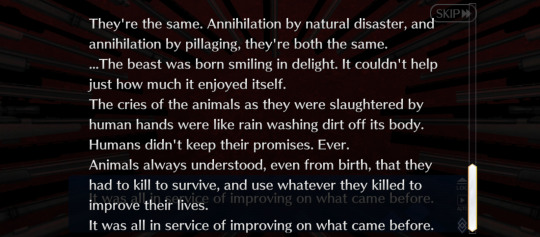
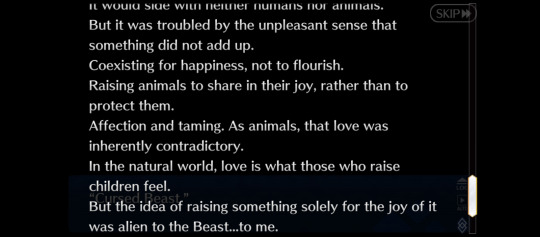
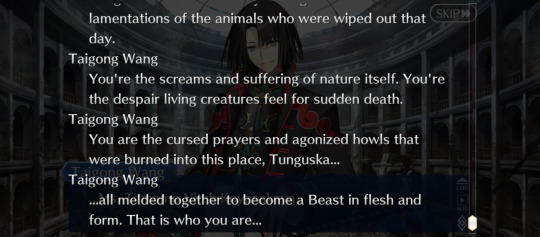
they were all fakers huh. not just koyan but all the alter egos of the foreign god even the foreign god itself with its quest for dominance they were all fakers who tried to surpass the original and who all had no true place among humans. koyan and limbo are obvious examples but it also applies to muramasa and rasputin (noted freaks and outcasts of their era and inhabiting individuals that reflect this accordingly) and holmes himself as a hidden traitor and reflection to moriarty.
koyanskaya wanted to emulate the monster that tamamo no mae once was, something that could freely torment and destroy humans, but tamamo was a being who had always strived for understanding yet was never shown compassion. shes so committed to the good wife role because its something that will have her accepted by other humans, and more specifically something that will help her understand human love. tamamo had always wanted love and acceptance by humanity, but koyanskaya already holds human love within her whether she likes it or not, not only because of her status as a beast but also because she's representative of the animals that have walked alongside humanity from the beginning. its why tamamo is her mirror, why koyanskaya was even classified as an alter ego of tamamo in the first place, and it's also why there's even a koyanskaya of the Light and a koyanskaya Go In The Dark: they not only represent the death and life zones of her reality marble, they're another emulation of tamamo having split herself apart into the tamamo nine (the bnuuy two?). koyanskaya isnt the tamamo no mae or a part of the nine, nor is she daji as well, but she is a being similar to them because she exists with the same natural dichotimatic feelings towards humans. they hold a love for humanity that is fundamentally at odds with their own nature as natural enemies of humanity.
I feel like this is in part why ibuki douji was the only servant that could be brought in from the outside: She's also a living calamity towards humans, a literal force of nature with a will of its own. she had amnesia entering tunguska because it was a world antithetical to humans, reflective of koyanskayas mindset but also her ideal vision of a world, full of beings removed from humans and defense mechanisms celebrating the murder humans are capable of. if you took her history with humanity away, the ibuki douji that's left is quite literally just a happy go lucky free spirit of nature in a world made for herself, no longer a venerated god or feared calamity.
deep down, it's what koyanskaya wanted for herself.
taigong knew that the fair faced golden fox was a being that couldn't help its nature, it was specifically born as a monster that was meant to torment and destroy humans, but he still fell in love with her not in spite of her nature but because of it. he knew that she was a monster that would only terrorize humans but as he sees her struggling to survive he can't help but empathize with that as a fellow human, and more than anything taigong follows through on dajis curse of immortality because that's what it meant to love her, to achieve her final dream. to carry the memory of someone you love
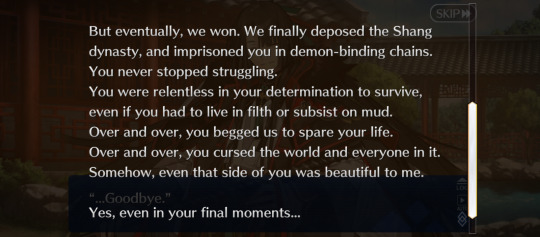
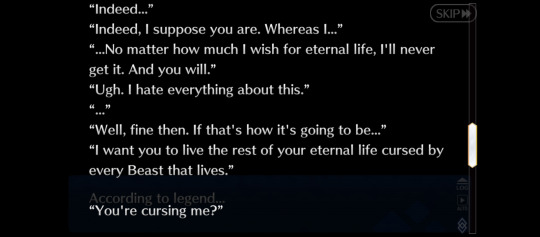
taigong and nikitich were the only servants able to be summoned into tunguska because they were the only ones who would have compassion for koyanskaya, and compassion, understanding is what's needed to defeat beasts of humanity. it's never about defeating the big enemy, its about reaching an understanding.
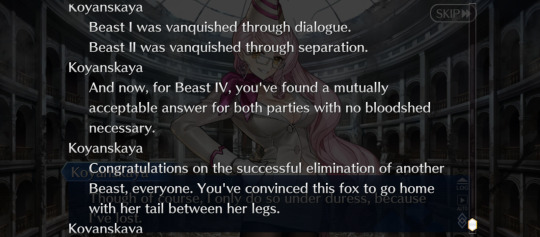
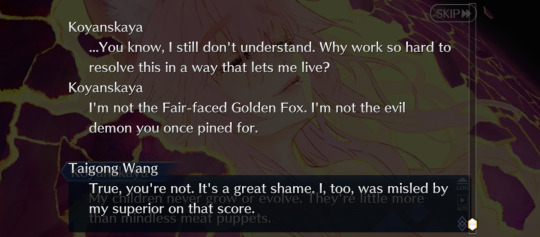
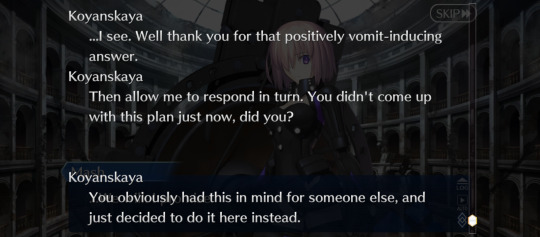
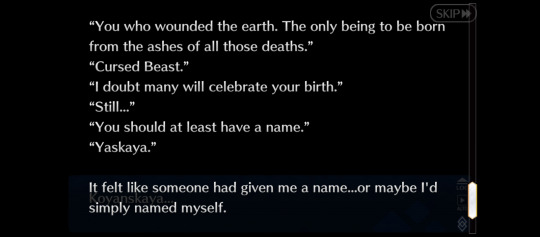
anyways they just needed like 1 extra tidbit to foreshadow this beforehand so that tunguska wouldnt have been so poorly received 2ish years ago (and i mean. we do have that moment in SIN with QSH thats even called out in koyanskayas profile) + proper scheduling to not have this critical story piece be a time limited raid event (lol epic of remnant gudaguda moment) but hey they're funny

#love❤️ was the answer all along. we defeat each alter ego with love❤️.#inside you are two wolves ones is a fox the other is a bnuuy both of them want to maul that man#comun watching me shift my opinion on koyan in real time like senator armstrong AM I FINALLY GETTING THROUGH...!?#fgo#fate grand order#zerav meta#koyanskaya
110 notes
·
View notes
Note
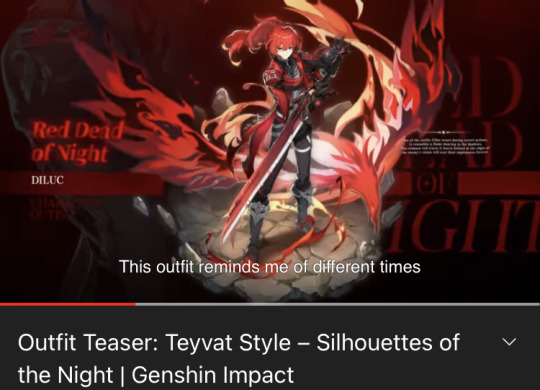
Aaahhhhh fkdbxjjsksoshsbsbskkdosoahacacrEqyqoek tcwnkdxragaolwbegdibqctsbsronstaownsgayainsbzfratiallenrbdhdoabsynskdndkdmsnshhs
AHHHHHHHHHHH ajsldksjdkaldkshfjshdhdjnsl
Diluc Diluc Diluc, why must you get so much hotter
#kiwi answers#bonnet my sweet darling sister#kiwi talks genshin#kiwi simps for diluc#i am SO EXCITED to see the story behind this new outfit#2.8 is gonna be epic#I’m also super excited for Kazuha’s story quest and Heizou’s hangout event
4 notes
·
View notes
Text
Play the Sidequests You Coward
Final Fantasy XVI is a litmus test for the patience gamers have for a story and worldbuilding.
FFXVI has got it's issues, it's combat is a bit over-reliant on the power of the dominant moves and is a little brain dead. It's crafitng system is... clearly forced in? Like the game did not NEED a crafting system and would probably be exactly the same without it. Late game the combat effects begin to obscure the screen and meld together so it gets to be a little difficult to tell what's going on.
That being said, the one and most common critique of FFXVI as being "objectively bad" are the sidequests. A critique I wholly disagree with and, to be honest, am sick and tired of hearing. When I see a reviewer critique the side quests as being boring and tearing away from the experience of the game, all I hear is "I didn't watch the cutscenes."
These quests are not just "collect 3 nuts, get shitty XP, and move on." These quests are world building and story fleshing out events. Some of the best stories are tucked away in these "fetch quests." These stories make the main quest feel MORE EPIC, MORE IMPACTFUL, not less.
As some have pointed out, CBUIII, the team that made FFXIV, clearly took their design for side quests from XIV and put it inot XVI. Except that's not true. They didn't take the structure for it's side quests, they took the structure from their main quests. FFXIV's main quest is filled with "go fetch 3 things," "go talk to X people," "hold my hand and give me a guided tour of X area." And to some people, these quests are "pointless filler." But to the people who are actually invested in FFXIV's story, you know these quests are ESSENTIAL to making the story as emotionally ressonant as it is.
The same is true for the sidequests in FFXVI. These quests feel as though they SHOULD be mandatory, not optional. But because FFXVI is a more mass-appealing game, CBUIII knew that not everyone would have the patience for dealing with these seemingly mundane issues. It was the correct move to make these sidequests. But they are anything but side content.
The sidequests are not boring fetchquests that give shit xp. They are story quests that flesh out the world of Valisthea, the people of the world, and Clive as a character. They show you why Clive fights for the right to live and die as you choose, they give the message of the game texture and depth. The main quests WORKS on it's own, but the side quests really elevate it, if you give them the time of day.
These are incredibly well written, emotionally resonant, and important missions that I am sick and tired for being compared to "shitty MMO quests." This isn't WoW where you help a random guy kill 40 boars and you never see them again. You getting that food to those people MATTER. Those people needed someone like them to reach out to them, or they may have had a much harder time integrating into a new life. Clive needed to see how horrible the world could be through the eyes of a child raised by a corrupt system. CLIVE would give a shit about the people who work for him and help them out when he can. He would want to LEARN about the people who are risking their lives day in and day out to help make their vision become reality.
Can some of the side quests feel boring? Sure. But that's kind of the point. These quests are grounded in reality and tedioum of life. Not nearly as much as in FFXIV, but still enough that it DOES test your patience and appreciation of the story and world. If you don't like that, that's ok it's why it's side content. But these quests ARE NOT MMO fetch quests. They matter and make the story better for existing.
#FFXVI#final fantasy 16#final fantasy XVI#ffxvi spoilers#I know no one is gonna read this but jfc I had to get this off my chest#I've seen one too many ciritques calling the sidequests mmo fetch quests and it drove me up the wall#ff16#ff16 spoilers
156 notes
·
View notes
Text
In the land of dreams, our hero's journey began. A simple man, with a heart full of love for his kin. He sought a magic artifact, whispered in lore, To mend what had been lost long before. He ventured far, over mountains tall, And through forests so dark and mysterious. He met beings of legend, both small and grand, And battled monsters with cursed ferocity. His heart grew strong, his courage unbound, As he found the artifact at last. With its power, he returned to his homeland, And saved those he held dearest in his past. In the end, our hero stood tall and proud, His epic quest complete, and a legend now born. For in this land of dreams, where heroes abound, He'd found love, courage, and truth reborn.
0 notes
Text
In twilight's grasp, a humble hobbit rose, To seek the ring, and face the foes. With courage born of heart and will, He ventured far, where hope did still. A sword of light, his trusty guide, And wizard's counsel, far and wide. Together they forged through despair, To face the darkness, without a care. In shadows deep, their journey led, Where heroes fell, and battles bled. But still our hero marched on strong, A legend born, where hope belonged.
#fantasy#short stories#writing#magical artifacts#epic quests#unlikely heroes#life#event#transformation
1 note
·
View note